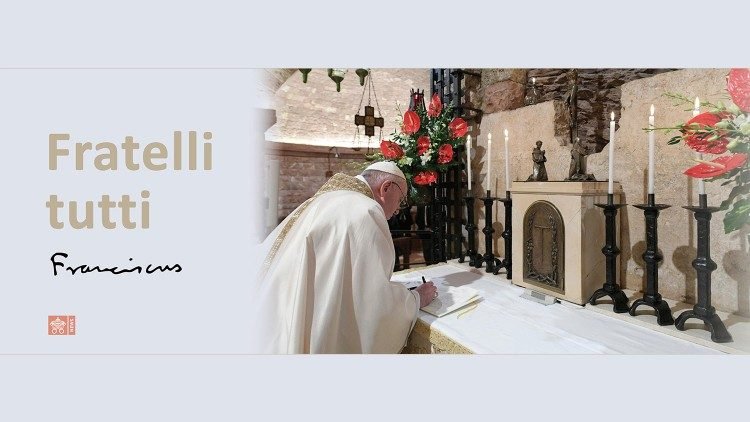Following the publication of the Pope’s encyclical “Fratelli Tutti” on Sunday, Bishops in the United States and Australia highlight his important appeals for solidarity and human fraternity.
By Vatican News
Pope Francis published his third Encyclical Letter Fratelli tutti on Fraternity and Social Friendship on Sunday.
Welcoming the Encyclical, Archbishop Mark Coleridge, the President of the Australian Bishops’ Conference, said in a statement on Sunday that a world that looks beyond a global pandemic with no roadmap can find one in the new Encyclical which “is not just for believers but for the entire human family.”
He added that it is “a vision of the dignity of every human being from which flows the call to build a new culture of fraternity and dialogue.”
Brothers and sisters all
Archbishop Coleridge pointed out that the Pope’s latest encyclical differs from the 2015 Laudato si in which he spoke of care of our common home. In Fratelli tutti he speaks of care for each other and the family that dwells together in our common home.
He noted that the Pope expresses his desire that, by acknowledging the dignity of each person, we might contribute to the rebirth of a universal aspiration to fraternity. The Holy Father also enjoins everyone to dream “as a single human family… each of us bringing the richness of his or her beliefs and convictions, each of us with his or her own voice, brothers and sisters all.”
Need for solidarity
The Archbishop said the Pope had started work on the Encyclical before the Covid-19 pandemic, which has highlighted the important need for solidarity even more, as it has created in many a “sense of interdependence of communities and the fragility of human beings left to themselves.”
Reiterating Pope Francis’s words, he pointed out that our worst response after the health crisis passes would be to plunge into “feverish consumerism and new forms of egotistic self-preservation.”
He added that the “current divisions and conflicts are a road to nowhere”, and enjoined that after this we no longer think in terms of “them” and “those”, but only “us.”
Unity, not division
Archbishop Coleridge also underscored the Pope’s call against ideologies that seek to divide rather than unite, and policies or economic systems that priorities profit over people and the planet.
In particular, he pointed out that those that the Pope describes certain people as often undervalued or treated inequitably – women, older people, unborn children, indigenous peoples, and migrants. The Archbishop said these are people who are also left on the margins in Australia. He therefore warns against thinking that the Pope’s message only regards other parts of the world.
Concluding, Archbishop Coleridge said that in the Encyclical, Pope Francis gives a “grand yet simple vision of human interconnectedness” as we are all connected in ways we can scarcely imagine.
“Our task now is to work out what this means in practice as we look beyond the pandemic,” Archbishop Coleridge said.
US Bishops
In the same vein, Archbishop José H. Gomez, president of the US Bishops’ Conference issued a statement on Sunday welcoming the new Encyclical.
“On behalf of the Catholic Church in the United States, I welcome the Holy Father’s new encyclical letter on human fraternity. Like Laudato si before it, Fratelli tutti is an important contribution to the Church’s rich tradition of social doctrine.”
He said the Pope’s teaching in the encyclical is “profound and beautiful;” highlighting that God has created every human being with “equal sanctity and dignity, equal rights and duties” and that God calls us to “form a single human family in which we live as brothers and sisters.”
Implications for Church and society
Archbishop Gomez highlighted that the Pope’s message reminds us of God’s plan for humanity which has implications for every aspect of our lives, including our personal relationships and how we organize our societies and economies.
Thus, in analyzing conditions in the world today, the Pope gives a “powerful and urgent vision for the moral renewal of politics and political and economic institutions”, which call us to build a common future that serves the good of the human person.
He also pointed out that for the Church, the Pope challenges us to overcome “individualism in our culture and to serve our neighbors in love, seeing Jesus Christ in every person, and seeking a society of Justice and mercy, compassion and mutual concern.”
Concluding, he prayed that Catholics and all people of goodwill may reflect on the Pope’s words and “enter into a new commitment to seek the unity of the human family.”



